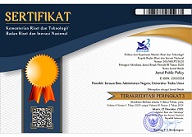Implementation of the Smart Village Nusantara (SVN) Program in Sambirejo Village, Sleman Regency
Abstract
This research will examine implementing the Smart Village Nusantara (SVN) program in the Sambirejo District. This research aims to determine the management and implementation of the village headquarters in implementing the smart village program, the aim of which is to facilitate the sustainable improvement of the welfare of the Sambirejo community. This sub-district, which is famous for its Breksi Cliff, is one of the sub-districts that has become a pilot project for other sub-districts to manage Bumdes and increase Ali Village Income (PADes). This is very different from the period in the 2000s when Sambirejo was even included in the list of the poorest villages in Sleman Regency. This problem is interesting to research because currently, villages have space to manage resources through various innovations after the existence of village law policies, namely Law Number 6 of 2014. A perspective is used to analyze this problem, namely the perspective of public policy implementation. Furthermore, the research method used in this research is a descriptive qualitative method. In the descriptive qualitative method, the factor that must be considered is the validity of the data, where this research uses a data triangulation model. Meanwhile, this research was conducted in Sambirejo Village in Sleman Regency. This research aims to determine the aspects that drive the success of the program and the challenges in implementing the smart village program in Sambirejo District through accelerating the smart economy, smart society, and smart government. It is hoped that this research will be able to produce at least three main findings. First, to what extent are efforts to implement smart villages implemented in the development of Sambirejo. Second, opportunities and challenges in implementing smart villages. Third, recommendations to relevant stakeholders.
Keywords
Full Text:
PDFReferences
Abdul Wahab, M.A, P. D. H. S. (2017). Analisis Kebijakan Dari Formulasi ke Penyusunan Model-Model Implementasi Kebijakan Publik (F. Hutari (ed.); Keenam). PT Bumi Aksara.
Carroll, J., 2020. One study, four cities: information impact in neighborhood economic development. Transform. Gov. People Process Policy 14 (4), 663–680. https://doi. org/10.1108/TG-07-2019-0070.
Glasmeier, A., Christopherson, S., 2015. Thinking about smart cities. Camb. J. Reg. Economy Soc. 8 (1), 3–12. https://doi.org/10.1093/cjres/rsu034.
Guzal-Dec, D., 2018. Intelligent development of the countryside – the concept of smart villages: assumptions, possibilities and implementation limitations. Econ. Reg. Stud. 11 (3), 32–49. https://doi.org/10.2478/ers-2018-0023.
He, S. Y., Lee, J., Zhou, T., & Wu, D. (2017). Shrinking cities and resource-based economy: The economic restructuring in China’s mining cities. Cities, 60, 75–83. https://doi.org/10.1016/j.cities.2016.07.009
Juceviˇcius, R., Pataˇsiene˙, I., Pataˇsius, M., 2014. Digital dimension of smart city: critical analysis. Procedia Soc. Behav. Sci. 156, 146–150. https://doi.org/10.1016/j. sbspro.2014.11.137.
Imronah. (n.d.). Perspektif , Model dan Kriteria Pengukurannya IMPLEMENTASI KEBIJAKAN : 65–85.
McArdle, K., 2012. What makes a successful rural regeneration partnership? The views of successful partners and the importance of ethos for the community development professional. Community Dev. 43 (3), 333–345. https://doi.org/10.1080/15575330.2011.621211.
Poggi, F., Firmino, A., Amado, M., 2015. Moving forward on sustainable energy transitions: the smart rural model. Eur. J. Sustain. Dev. 4, 43–50. https://doi.org/ 10.14207/ejsd.2015.v4n2p43.
Renukappa, S., Suresh, S., Abdalla, W., Shetty, N., Yabbati, N., & Hiremath, R. (2022). Evaluation of smart village strategies and challenges. SMART AND SUSTAINABLE BUILT ENVIRONMENT.
Sampetoding, Eliyah Acantha Manapa & Mahendrawathi ER. (2024). Digital Transformation of Smart Village: A Systematic Literature Review
Sugiyono, P. F. (2016). Metode Penelitian Kuantitatif, Kualitatif, dan R&D (23rd ed.). ALFABETA, CV. www.cvalfabeta.com
Susilowati, Anindya Puteri Eka, Rini Rachmawati, R. Rijanta. 2024.
Van Gevelt, T., Canales Holzeis, C., Fennell, S., Heap, B., Holmes, J., Hurley Depret, M., Jones, B., Safdar, M.T., 2018. Achieving universal energy access and rural development through smart villages. Energy Sustain. Dev. 43, 139–142. https://doi. org/10.1016/j.esd.2018.01.005.
Visvizi, A., Lytras, M.D., 2018. It’s not a fad: smart cities and smart villages research in European and global contexts. Sustainability 10 (8), 2727. https://doi.org/10.3390/ su10082727.
Wang, C., Zhou, T., & Ren, M. (2023). Driving spatial network connections in rural settlements: The role of e-commerce. Applied Geography, 159, Article 103067. https://doi.org/10.1016/j.apgeog.2023.103067
Wassmann, R., Villanueva, J., Khounthavong, M., Okumu, B.O., Vo, T.B.T., Sander, B.O., 2019. Adaptation, mitigation and food security: multi-criteria ranking system for climate-smart agriculture technologies illustrated for rainfed rice in Laos. Glob. Food Secur. 23, 33–40. https://doi.org/10.1016/j.gfs.2019.02.003.
Wolski, O., 2018. Smart villages in the UE policy: how to match innovativeness and pragmatism? Wie´s Rol. 4 (181), 163–179. https://doi.org/10.7366/wir042018/09.
Wolski, O., Wo´jcik, M., 2018. Podłoz˙e teoretyczne podej´scia smart villages w polityce UE. Perspektywa geograficzna (theoretical considerations on the smart villages approach in the EU Policy: a geographical perspective). Stud. Obsz. Wiej. 51, 139–152. https://doi.org/10.7163/SOW.51.8.
Zavratnik, V., Kos, A., Duh, E.S., 2018. Smart villages: comprehensive review of initiatives and practices. Sustainability 10 (7), 2559. https://doi.org/10.3390/ su10072559.
Zhimin, He,. Meiling Chen, Dongming Gu. (2024). How digital village construction affects to the effectiveness of rural governance? — Research on the NCA and QCA methods.
DOI: https://doi.org/10.35308/jpp.v10i4.8857
Refbacks
- There are currently no refbacks.
Copyright (c) 2024 Agustina Rahmawati, Hanantyo Sri Nugroho, Vidia Lestari
p-ISSN: 2477-5738 I e-ISSN: 2502-0528 I DOI: 10.35308
Jl. Alue Peunyareng, Ujong Tanoh Darat, Meureubo, Kabupaten Aceh Barat, Aceh 23681, Indonesia
(0655) 7110535 l +621260313742 l +6285277110911
 is licensed under a Creative Commons Attribution-ShareAlike 4.0 International License
is licensed under a Creative Commons Attribution-ShareAlike 4.0 International License


